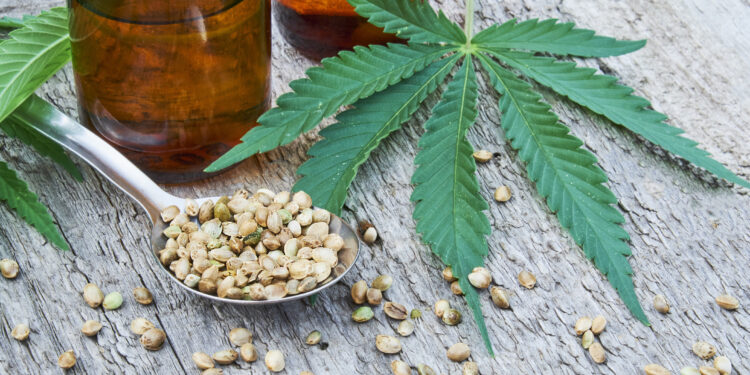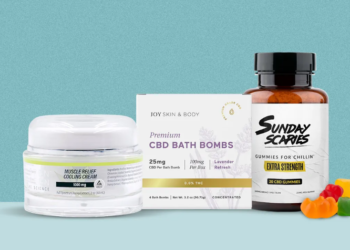Be aware: Is CBD permitted?
A frequent natural treatment for many common ills is Cannabidiol. Federal law makes hemp-derived CBD products (with less than 0.3% THC) legal, but certain state laws still forbid their sale.
CBD products made from cannabis are forbidden by federal law, however, they are permitted by some state regulations.
Verify local and national laws wherever you go. Also, keep in mind that nonprescription CBD products may not be appropriately labeled and are not FDA-approved.
It is one of more than 100 chemical substances known as cannabinoids that are present in the cannabis plant, Cannabis sativa, and is more popularly known as CBD (1Trusted Source).
The primary psychoactive cannabinoid in cannabis, tetrahydrocannabinol (THC), is responsible for the high that is frequently associated with cannabis use. CBD, on the other hand, is not psychotropic like THC.
Due to this characteristic, CBD is a desirable alternative for those seeking pain treatment and other ailments without the psychoactive effects of cannabis or other negative side effects associated with some prescription medications.
CBD from the cannabis plant is extracted to make CBD oil, which is then diluted with a carrier oil like coconut oil or hemp seed oil. A wide range of goods, including dietary supplements, bath soaks, drinks, and food, may be found with CBD online and in stores.
It is gaining popularity in the health and wellness industry, and some research suggests that it may help with the symptoms of illnesses, including anxiety and chronic pain.
However, is it the best option for you?
This article discusses six CBD-related health advantages that have been supported by research, as well as possible negative effects and safety issues with CBD products.
Products containing CBD have swept the herbal community by storm in recent years. You may now get infused balms, oils, and pet supplies in your favorite grocery shop. Even smokers find CBD enticing, and some employ flashy accessories like small dab rigs to get the most out of the botanical product.
The variety of cannabidiol products on the market has elevated them to the top of the list for people looking to live better lives. People use CBD for a variety of purposes, including pain management and sleep aid.
If you’re curious about what cannabidiol can do for you, have a look at the following advantages and negative effects of CBD use.
May reduce persistent pain
Using CBD instead of conventional painkillers is one of its main applications. Many herbal lovers choose delectable cannabidiol edibles or infused tinctures over costly, potentially addictive medications. Some studies on CBD use have discovered a reduction in inflammation and neuropathic pain, while current research is inconclusive in this area.
Could support the recovery from addiction
A 2015 review that appeared in the medical journal Substance Abuse suggests that using CBD oil may help people recover from addiction. Although results differ depending on the substance, including cannabidiol in treatment regimens may aid with withdrawal. Other CBD studies have discovered a decrease in cravings and anxiety associated with addiction.
Cure skin conditions
Skin diseases, including acne and psoriasis, may benefit from cannabidiol’s ability to reduce inflammation. CBD interacts with oil glands, whether used topically or eaten to soothe breakouts and lessen the redness. Numerous skincare businesses have taken notice of CBD’s potential therapeutic benefits and are including botanical elements in their serums and treatments.
It might help with sleep.
Initial research on CBD’s effects on sleep disorders has yielded promising results. Sleeping longer and deeper has been observed by people with chronic pain, anxiety, and depression. CBD’s capacity to facilitate sleep ultimately depends on the dosage and method of intake.
Possible negative effects
Clinical research has discovered certain CBD use adverse effects in addition to the numerous benefits. Changes in appetite and mood are two common side effects, however severity varies depending on the individual. Additionally, some people have experienced nausea, tiredness, and diarrhoea. Cannabidiol use has occasionally also caused nausea and vomiting. Before adding CBD into their routine, those with health issues should, as with any treatment, talk to their doctor. Particularly those who have liver problems, ocular conditions, or who are pregnant or nursing.
Cannabidiol has a promising future, and as more people across the world become aware of its therapeutic potential, the possibilities are virtually endless.
Effects of CBD products that could be negative
Although CBD is generally well-tolerated and regarded as harmless, some people may experience negative side effects.
Studies have identified the following side effects (33Trusted Source):
- Diarrhea
- Modifications to appetite and weight
- Fatigue
Studies on pediatric epilepsy have noted additional side effects, including as pneumonia, sleepiness, sedation, and abnormal liver function test results. But these outcomes might be the result of CBD’s interactions with other drugs, like clobazam (34Trusted Source).
In reality, Cannabidiol interacts with a number of drugs, including those used to treat diabetes, depression, seizures, and pain. Consult a medical expert before using Cannabidiol oil to determine the safety and prevent any potential interactions that could be dangerous (35Trusted Source, 36Trusted Source).
It’s also crucial to keep in mind that the market is currently flooded with low-quality Cannabidiol products.
CBD is touted as a solution to treat stress, pain, and sleep problems and is added to foods, beverages, nutritional supplements, and body care products.
This does not imply that you should incorporate any of these foods into your diet or health regimen, nevertheless.
Although some research suggests that CBD may be beneficial for particular areas of health, dosage in trials varies greatly. Choosing the right dose to address a particular health issue can be challenging.
Furthermore, many products don’t simply contain CBD; they also have a variety of other substances. For instance, given that many plants have the potential to interact with regularly prescribed drugs, dietary supplements containing CBD, as well as a combination of herbal substances, may not be safe for everyone.
Before using a CBD product, discuss the proper dosage and any other questions you may have with a healthcare expert.
If you do decide to use a CBD product, pick one that has undergone quality and purity testing by a third party.
Last thoughts
The research into CBD’s various advantages is still in its infancy, and laboratories throughout the world are attempting to reveal the herb’s undiscovered powers. But Cannabidiol might provide much-needed comfort for those who battle substance dependency and chronic pain. The substance has also shown promise in treating severe skin problems and crippling sleep disorders. Of course, consulting with your doctor is the most important step before incorporating Cannabidiol into your daily health regimen.






